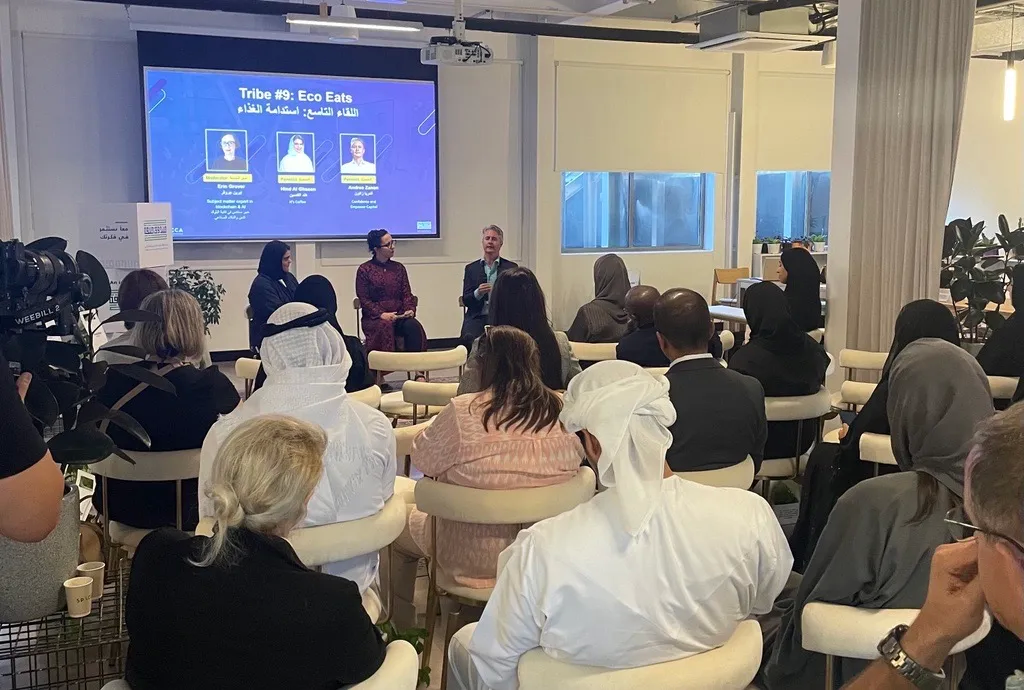According to the UAE Ministry of Economy, small and medium-sized enterprises (SMEs) account for more than 94% of the total number of companies operating within the UAE. As a think tank focused on the growth of the green economy, it is essential that we offer support to SMEs that are dealing with sustainability challenges across the country.
Securing a reliable food supply is one of the key priorities, as outlined by the National Strategy for Food Security. This strategy sets forth an aim for the UAE to significantly advance in the Global Food Security Index by 2051. Essential to this mission is the promotion of the domestic Food and Beverage (F&B) industry, with a special emphasis on the development of SMEs.
In line with achieving national sustainability targets, it is crucial to implement sustainable practices within the F&B sector. The United Nations Food and Agriculture Organization (FAO) reports that one-third of the world’s greenhouse gas emissions arise from the production, processing, and packaging of food. Furthermore, food loss and waste contribute to over 38% of the total energy consumption in the global food system.
Interviews with local restaurant owners have revealed a gap in understanding and applying sustainable practices within their business operations. It has also become apparent that there is a scarcity of opportunities for these entrepreneurs and small businesses to share information. To address this challenge, the UAE Independent Climate Change Accelerators (UICCA) and the Khalifa Fund for Enterprise Development have co-produced a joint event to serve as a means to facilitate the exchange of best practices between international and local entrepreneurs.
Fostering Sustainability in the F&B Sector: Insights from the “Eco Eats” SME Tribe
SME Tribe, an established initiative by Khalifa Fund for Enterprise Development, brings together emerging and aspiring entrepreneurs to engage in a dialogue aimed at enhancing the UAE’s entrepreneurial ecosystem. In this edition titled ‘SME Tribe: Eco Eats,’ Khalifa Fund collaborated with the UICCA, to provide a platform for industry experts and entrepreneurs to share insights and best practices with F&B businesses, equipping them with practical skills and tools to implement sustainable practices within their operations.
Key experts included Andrea Zanon, Founder & CEO of Confidente, Erin Grover, Blockchain and Food Security World Economic Forum Expert, and Hind Al Elghseen, Founder of H’s Coffee.
The panel of experts, each speaking from a different perspective in the SME value chain, discussed four key topics:
- Identifying the role of SMEs in driving sustainable F&B sector and circular economy.
- Recognizing that sustainability and profitability can be achievable.
- Promoting inclusiveness: the need to empower women entrepreneurs.
- Co-building an enabling environment for SMEs through effective policies & regulations.
The role of SMEs in driving sustainable F&B sector
SMEs are a cornerstone of economic growth and societal progress, accounting for over 94% of businesses. Their adoption of sustainable practices can spur innovation, create eco-friendly jobs, and attract investments.
When SMEs integrate sustainability into their operations, they not only gain a competitive advantage by appealing to eco-conscious consumers but also enhance their resilience to environmental risks. Sustainable practices, such as optimizing supply chains, minimizing waste, and reducing environmental footprints, strengthen SMEs against disruptions.
In a dynamic business landscape, the alignment of sustainable practices with consumer demands, cost efficiency, regulatory compliance, and resilience is crucial for business success and growth.
Sustainability and profitability can coexist
In the UAE, the F&B sector generates revenues surpassing $37.76 billion, with an anticipated annual growth rate of 5.13% from 2023 to 2028. This upward trend offers SMEs a significant opportunity to engage with a burgeoning market and provide specialized services that local restaurants require.
Interactions with Abu Dhabi restaurant owners underscore the necessity of directing businesses towards economically feasible and implementable solutions in the short to medium term. Emphasizing the principles of a circular economy, a key strategy put forth involves local sourcing and enhancing the local production of sustainable packaging.
Specifically, Hind suggests that by consolidating the demand for sustainable packaging, SMEs could benefit from economies of scale through bulk purchases from local producers. This strategy would help ensure that adopting sustainable solutions remains cost-effective for SMEs.
Promoting inclusivity
Inclusivity is key for SMEs, especially within the F&B sector, to thrive across the country due to several reasons. In a sector that caters to a wide range of tastes and cultural preferences, diversity allows for a more nuanced understanding of consumer needs and preferences. In addition, embracing inclusive principles promotes further innovation and allows employees to feel valued thus leading to a positive impact of the overall success and sustainability of an enterprise.
A joint study by UN Women and NAMA Women Advancement Establishment reveals that in the UAE, women are less likely to embark on entrepreneurial ventures compared to men. However, the landscape is changing due to the active role of businesswomen councils that advocate for legislation to support and empower Emirati and young female entrepreneurs. Notable initiatives include “Intilaq” by the Dubai Chamber of Commerce, “Badiri” and “Irthi” by NAMA in Sharjah, and “Sougha” and “Mubdi’ah” launched by the Abu Dhabi Businesswomen Council. Presently, women own about 47.6% of SMEs in the UAE, indicating a shift towards a more diverse and inclusive business ecosystem that fosters innovation and sustainability.
During the SME Tribe Eco Eats event, Andrea underscored the importance of investing in women, stating, “Investing in the success and futures of women is one of the best ways to grow businesses while creating shared prosperity for your country.” As the founder of We Empower Cities Foundation since 2017, Zanon has been instrumental in providing female entrepreneurs worldwide with access to early-stage capital, training, professional networks, and mentorship to enhance their success. Through partnerships with over a hundred global investors and international financial institutions, his foundation has catalyzed the growth of early-stage companies in 14 countries across the Middle East and Latin America, supporting over ten thousand women entrepreneurs.
Creating an enabling environment for SMEs through appropriate policies and regulations
The role of a government will be key in creating an enabling environment by deploying appropriate policy instruments and regulations, in addition to providing financial and technical support, and simplified regulations that foster development for SMEs.
SMEs are increasingly impacted by the evolving requirements of sustainability reporting, posing a considerable challenge. A significant proportion of SMEs may face the risk of losing external financing as finance providers are now mandated to disclose the sustainability credentials of their investment portfolios.
Insights from restaurant owners within the region gathered during and after our forum, highlighted multiple challenges that SMEs encounter due to current policies and regulations. These challenges can obstruct their sustainability initiatives and include high compliance costs, regulatory complexity, limited access to finance, and a need for more training and capacity building.
The financial strain of adhering to intricate sustainability regulations can deter SMEs from making necessary investments in sustainable practices.
For SMEs to effectively engage in sustainability and overcome these obstacles, it is imperative that government entities and supporting organizations provide educational materials, financial support, and streamlined regulations designed to nurture SME growth.
According to the UAE Ministry of Economy, small and medium-sized enterprises (SMEs) account for more than 94% of the total number of companies operating within the UAE. As a think tank focused on the growth of the green economy, it is essential that we offer support to SMEs that are dealing with sustainability challenges across the country.
Securing a reliable food supply is one of the key priorities, as outlined by the National Strategy for Food Security. This strategy sets forth an aim for the UAE to significantly advance in the Global Food Security Index by 2051. Essential to this mission is the promotion of the domestic Food and Beverage (F&B) industry, with a special emphasis on the development of SMEs.
In line with achieving national sustainability targets, it is crucial to implement sustainable practices within the F&B sector. The United Nations Food and Agriculture Organization (FAO) reports that one-third of the world’s greenhouse gas emissions arise from the production, processing, and packaging of food. Furthermore, food loss and waste contribute to over 38% of the total energy consumption in the global food system.
Interviews with local restaurant owners have revealed a gap in understanding and applying sustainable practices within their business operations. It has also become apparent that there is a scarcity of opportunities for these entrepreneurs and small businesses to share information. To address this challenge, the UAE Independent Climate Change Accelerators (UICCA) and the Khalifa Fund for Enterprise Development have co-produced a joint event to serve as a means to facilitate the exchange of best practices between international and local entrepreneurs.
Fostering Sustainability in the F&B Sector: Insights from the “Eco Eats” SME Tribe
SME Tribe, an established initiative by Khalifa Fund for Enterprise Development, brings together emerging and aspiring entrepreneurs to engage in a dialogue aimed at enhancing the UAE’s entrepreneurial ecosystem. In this edition titled ‘SME Tribe: Eco Eats,’ Khalifa Fund collaborated with the UICCA, to provide a platform for industry experts and entrepreneurs to share insights and best practices with F&B businesses, equipping them with practical skills and tools to implement sustainable practices within their operations.
Key experts included Andrea Zanon, Founder & CEO of Confidente, Erin Grover, Blockchain and Food Security World Economic Forum Expert, and Hind Al Elghseen, Founder of H’s Coffee.
The panel of experts, each speaking from a different perspective in the SME value chain, discussed four key topics:
- Identifying the role of SMEs in driving sustainable F&B sector and circular economy.
- Recognizing that sustainability and profitability can be achievable.
- Promoting inclusiveness: the need to empower women entrepreneurs.
- Co-building an enabling environment for SMEs through effective policies & regulations.
The role of SMEs in driving sustainable F&B sector
SMEs are a cornerstone of economic growth and societal progress, accounting for over 94% of businesses. Their adoption of sustainable practices can spur innovation, create eco-friendly jobs, and attract investments.
When SMEs integrate sustainability into their operations, they not only gain a competitive advantage by appealing to eco-conscious consumers but also enhance their resilience to environmental risks. Sustainable practices, such as optimizing supply chains, minimizing waste, and reducing environmental footprints, strengthen SMEs against disruptions.
In a dynamic business landscape, the alignment of sustainable practices with consumer demands, cost efficiency, regulatory compliance, and resilience is crucial for business success and growth.
Sustainability and profitability can coexist
In the UAE, the F&B sector generates revenues surpassing $37.76 billion, with an anticipated annual growth rate of 5.13% from 2023 to 2028. This upward trend offers SMEs a significant opportunity to engage with a burgeoning market and provide specialized services that local restaurants require.
Interactions with Abu Dhabi restaurant owners underscore the necessity of directing businesses towards economically feasible and implementable solutions in the short to medium term. Emphasizing the principles of a circular economy, a key strategy put forth involves local sourcing and enhancing the local production of sustainable packaging.
Specifically, Hind suggests that by consolidating the demand for sustainable packaging, SMEs could benefit from economies of scale through bulk purchases from local producers. This strategy would help ensure that adopting sustainable solutions remains cost-effective for SMEs.
Promoting inclusivity
Inclusivity is key for SMEs, especially within the F&B sector, to thrive across the country due to several reasons. In a sector that caters to a wide range of tastes and cultural preferences, diversity allows for a more nuanced understanding of consumer needs and preferences. In addition, embracing inclusive principles promotes further innovation and allows employees to feel valued thus leading to a positive impact of the overall success and sustainability of an enterprise.
A joint study by UN Women and NAMA Women Advancement Establishment reveals that in the UAE, women are less likely to embark on entrepreneurial ventures compared to men. However, the landscape is changing due to the active role of businesswomen councils that advocate for legislation to support and empower Emirati and young female entrepreneurs. Notable initiatives include “Intilaq” by the Dubai Chamber of Commerce, “Badiri” and “Irthi” by NAMA in Sharjah, and “Sougha” and “Mubdi’ah” launched by the Abu Dhabi Businesswomen Council. Presently, women own about 47.6% of SMEs in the UAE, indicating a shift towards a more diverse and inclusive business ecosystem that fosters innovation and sustainability.
During the SME Tribe Eco Eats event, Andrea underscored the importance of investing in women, stating, “Investing in the success and futures of women is one of the best ways to grow businesses while creating shared prosperity for your country.” As the founder of We Empower Cities Foundation since 2017, Zanon has been instrumental in providing female entrepreneurs worldwide with access to early-stage capital, training, professional networks, and mentorship to enhance their success. Through partnerships with over a hundred global investors and international financial institutions, his foundation has catalyzed the growth of early-stage companies in 14 countries across the Middle East and Latin America, supporting over ten thousand women entrepreneurs.
Creating an enabling environment for SMEs through appropriate policies and regulations
The role of a government will be key in creating an enabling environment by deploying appropriate policy instruments and regulations, in addition to providing financial and technical support, and simplified regulations that foster development for SMEs.
SMEs are increasingly impacted by the evolving requirements of sustainability reporting, posing a considerable challenge. A significant proportion of SMEs may face the risk of losing external financing as finance providers are now mandated to disclose the sustainability credentials of their investment portfolios.
Insights from restaurant owners within the region gathered during and after our forum, highlighted multiple challenges that SMEs encounter due to current policies and regulations. These challenges can obstruct their sustainability initiatives and include high compliance costs, regulatory complexity, limited access to finance, and a need for more training and capacity building.
The financial strain of adhering to intricate sustainability regulations can deter SMEs from making necessary investments in sustainable practices.
For SMEs to effectively engage in sustainability and overcome these obstacles, it is imperative that government entities and supporting organizations provide educational materials, financial support, and streamlined regulations designed to nurture SME growth.
Concluding Thoughts:
Thank you for taking the time to read our UICCA thought leadership posting on SMEs.
We hope this is just an introduction to understanding how we plan to foster the resilience and brilliance of the UAE SME ecosystem and work together to create a sustainable future for all. If you are an entrepreneur or innovator in the UAE seeking support and expertise on sustainability-related matters, register your interest using this form.






